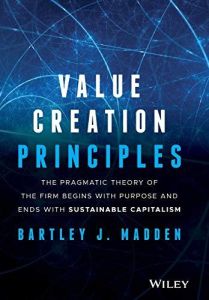Melden Sie sich bei getAbstract an, um die Zusammenfassung zu erhalten.

Melden Sie sich bei getAbstract an, um die Zusammenfassung zu erhalten.
Bartley J. Madden
Value Creation Principles
The Pragmatic Theory of the Firm Begins with Purpose and Ends with Sustainable Capitalism
Wiley, 2020
Was ist drin?
Still looking at price-to-earnings ratios? If so, you’re missing out on the market’s true winners.
Recommendation
Wonder why the stocks of old-school companies struggle, while the shares of stars like Amazon, Apple and Netflix keep soaring? Investment researcher Bartley J. Madden offers some valuable insights into the shift from the old economy to the new. He highlights the fact that, in the 20th century, blue-chip firms leveraged factories and other hard assets, but today, the most valuable companies prosper by creating virtual platforms and strong brands. This intriguing text for investors describes the secret sauce behind some of the world’s most iconic firms.
Summary
About the Author
Bartley J. Madden is an independent researcher who focuses on value creation and knowledge building. He retired as a managing director at Credit Suisse
HOLT and founded Callard Madden & Associates.























Comment on this summary